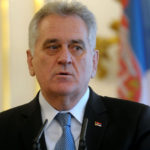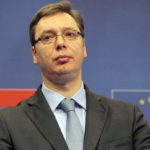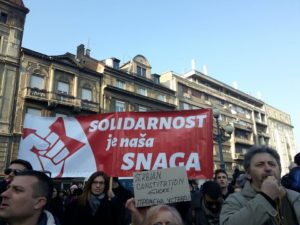The Trump Effect in the Balkans: Serbia’s Third Election in Four Years?

Serbia faces a set of regular presidential elections this year – but also the prospect of its third parliamentary election in four years. The latter possibility confirms those analyses that have posited the instability of Serbian politics in spite of the appearance of stability, following the ruling coalition winning almost half the votes cast in both previous elections.
Serbia after Milošević: Between West and East
From the fall of Slobodan Milošević in 2000 to the presidential elections of 2012, Serbian politics was primarily divided geopolitically. Serbia’s governments predominantly took the form of liberal coalitions looking West. The opposition was led by the pro-Russian radicals.
In truth, however, Serbia’s governing coalitions were pacts between pro-Western and pro-Russian elements. This reflected the tensions in the Serbian ruling class. Most wanted to enter the European Union, but most also feared losing popularity if they were seen to give up Serbia’s claim to Kosovo. The latter ambition led every government to rely on the Russian veto in the UN.
What occurred in 2012 on the surface represented a return to the pre-2000 era. The new government was made up of the two ruling parties of the 1990s, Milošević’s socialists and the successor party to Milošević’s coalition partners, the Radicals. This was indeed a break with post-2000 Serbian politics, but the break turned out to be superficial.
Serbia: illiberal but unstable since 2012

Tomislav Nikolic
The victory of former radical Tomislav Nikolić in the presidential election of 2012 led to a new series of governments with pro-Western and pro-Russian elements – with a fundamental orientation still towards the West. So there was little change there. The big change was the acceleration of the creep towards an illiberal democracy.
Moreover, Nikolić remained ironically more pro-Russian than his second in command and soon Prime Minister, Aleksandar Vučić. The Progressives, as their party was called, remained itself divided, but Vučić took a decisively pro-Western course since becoming PM in 2014. His popularity had to do with his early moves to arrest unpopular tycoons (Serbian oligarchs) in an anti-corruption campaign. He could also count on his nationalist past and his macho style to win adherents in a population eager for a decisive leadership following years of austerity and crisis.
Vučić: more IMF than the IMF

Aleksandar Vučić
Vučić was however committed to neoliberalism. He was more eager to implement IMF reforms than his predecessors and even said he was “more IMF than the IMF” when announcing he would maintain a freeze on public sector jobs and pensions in summer 2015. He also rammed through anti-strike legislation despite vocal trade union opposition. Geopolitically, he continued the EU-sponsored dialogue with the Kosovo authorities which had begun after 2012. Importantly, he undertook more military exercises with NATO than Russia, a clear indication of his preferences.
Despite this, he managed to win another election in 2016 which he called to consolidate his position. The gamble failed: though he won roughly half the votes, his position in parliament was worse, since more parties crossed the threshold than in 2015. Worse, on election day, masked goons demolished buildings which were a key obstacle to his hopes for the gentrification of Belgrade Waterfront in central Belgrade. A security guard in one of the buildings died.
The return of mass protests
His time in power has since been mired by increasing allegations of corruption against his associates like the Belgrade mayor Siniša Mali. Moreover, mass protests have finally hit the streets in Serbia. Serbia was the only country which had not seen mass protests since the 2008 recession in the entire Balkan region. Finally, it seemed this was coming to an end. Groups, suspended between NGO and social movement activism, organised continued mass demonstrations with tens of thousands turning out. Similar protests recently spread in relation to heating problems in the city of Niš.
So why is he risking another election? Partly, it has to do with Nikolić. Nikolić is up for re-election having served out his first five-year term. Though still a winner in the second round, Nikolić is a risk for Progressive domination. Should an opposition candidate cash in on discontent, like Nikolić had done in 2012, then all could be jeopardised. Polls were suggesting Vučić could win in the first round. Certainly, Vučić’s ambitions to have total control, having got rid of his mentor, are another factor.
The Trump effect – and the continued importance of geopolitics
But in truth, there is also the geopolitical question. As a small country with unsettled borders, Serbia still seeks Great Power sponsors. From this vantage point, Nikolić is seen by many as more pro-Russian than Vučić. Tensions on this question have been simmering for a long time between the two men. It seems that the American elections present the possibility of novel global re-alignments, something Vučić is likely to have wanted to exploit.
To back up this claim, we need only perform a swift mental experiment. What would have happened had Trump not won? Serbia might have needed greater support from Russia in the event of a Hilary Clinton victory. Clinton is known as a tough opponent of Serbia’s claim to Kosovo. In these circumstances, maintaining Nikolić as president would have made sense. He could be the nod to Russia that Serbia still saw Moscow as a valued partner, while Vučić could deal with Clinton.
But in reality, things are now different. Donald Trump is certainly an unknown quantity. His team has suggested Serbia would have to recognise Kosovo to enter the EU – this is unprecedentedly frank. Like most things coming from Washington, it is being greeted with little credulity on the ground. Something, surely, is different in the US now. Trump is a pragmatist. The nervousness in palpable in Kosovo, with the “Newborn” independence monument, which changes every year, this year being re-arranged to read “no walls” – a message to Serbia, but also to Trump.
In this context, it seems Vučić thinks he is the better candidate to make the calls and make a deal with the US if needed. The US has also made fewer signs it supports Serbia’s path to the EU – amid a more lukewarm approach to the EU more generally – but it has praised Serbia’s desire to be closer to NATO. With Montenegro also on the verge of joining NATO despite mass opposition, Serbia remains a key link for the US hopes of ousting Russia from the region. Vučić as president could be seen as an asset in Washington.
New elections: a gamble?
Vučić’s decision to run for president has left Nikolić seething. Since the decision became public on Valentine’s Day, news has reached the press that Nikolić is preparing to stand anyway and break with his party, taking 12 MPs with him. Should this take place, Vučić’s coalition would risk its majority and rely even more heavily onDačić’s pro-Russian Socialists. This may suit Vučić – he is known to have compromising materials on the socialist leader’s links with the mafia underworld. So he could still run things as ceremonial president indirectly, and keep Russian happy by having Dačić as PM.
The trouble is that is still risky. Relying on Trump is a gamble. Taking on a ceremonial position and counting on others is not something Vučić could be keen on, though he has seen Putin do it before. With mass protests against his pilot project in Belgrade continuing, however, Vučić faces continued instability and possibly major challenges in the future. So he may risk a parliamentary election now. Who knows, he may lose out ever more in the uncertain future. Serbia’s balancing game between West and East may yet claim its least expected victim.
What should the left do?
For the left, this renewed instability opens up possibilities. Unfortunately, the majority of those organising protests in Serbia have already come out for the main liberal candidate, Saša Janković. The other liberal is ex-UN head of the General Assembly, Vuk Jeremić, who may yet be seen as a more credible candidate against Vučić. The liberal opposition remains divided and unstable.

Belgrade protests, February 15, 2017
All the same, the masses on the streets are not all middle class liberals, and many are protesting attacks on public space – in other words, they are defending their social rights. The protests surrounding heating in Niš are even more clearly social in character. Worker discontent is palpable.
The left is still small and attempts at regroupment have so far failed. Nonetheless, possibilities for small groups of leftists exist. Intervening with clear demands placing class issues at the forefront can be a major recruiting ground for the left. The revolutionary group Marks21 has recruited from the demonstrations by intervening with a banner and leaflets.
Intervening can also help shift some of social movement actors to the left, changing the dynamic in the protests. Many are sympathetic and want to believe in alternatives. Building fighting united fronts and shifting the mass mood will encourage them. With local elections on the horizon, opportunities exist on that front of struggle as well, which can be used to strengthen the confidence of the movement on the streets and in workplaces.
Making links between similar movements for defence of public space and social rights in Croatia would be a further move forward, and not just because the Croatian movement is in advance of the movement in Serbia.
Creating such linkages across the region of the former Yugoslavia would be a concrete way of combating nationalism and showing the potential of regional federalism as an alternative to leaning West or East.
Similarly, another important campaign which could put the left in a position of prominence could be be emulation of the Movement for Neutrality of Montenegro.
With Greece also on the verge of bankruptcy, the Balkans will certainly return to the news in 2017 and 2018. The anti-capitalist left should not be standing on the side-lines. It should be in the thick of the struggle.
Vladimir Unkovski-Korica is a member of Marks21 in Serbia. He is a historian and researcher who is currently Lecturer in Central and East European Studies at the University of Glasgow. His book The Economic Struggle for Power in Tito’s Yugoslavia: From World War II to Non-Alignment came out of I.B.Taurus in 2016.

